
The Cinema of Italy comprises the films made within Italy or by Italian directors. The first Italian director is considered to be Vittorio Calcina, a collaborator of the Lumière Brothers, who filmed Pope Leo XIII in 1896. Since its beginning, Italian cinema has influenced film movements worldwide. As of 2018, Italian films have won 14 Academy Awards for Best Foreign Language Film as well as 12 Palmes d'Or, one Academy Award for Best Picture and many Golden Lions and Golden Bears.

Vittorio De Sica was an Italian director and actor, a leading figure in the neorealist movement.

Italian neorealism, also known as the Golden Age, is a national film movement characterized by stories set amongst the poor and the working class, filmed on location, frequently using non-professional actors. Italian neorealism films mostly contend with the difficult economic and moral conditions of post-World War II Italy, representing changes in the Italian psyche and conditions of everyday life, including poverty, oppression, injustice, and desperation.
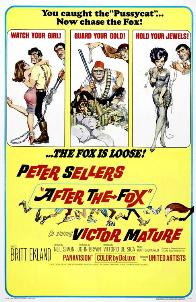
After the Fox is a 1966 British–Italian heist comedy film directed by Vittorio De Sica and starring Peter Sellers, Victor Mature and Britt Ekland. The English-language screenplay is by Neil Simon and De Sica's longtime collaborator Cesare Zavattini.
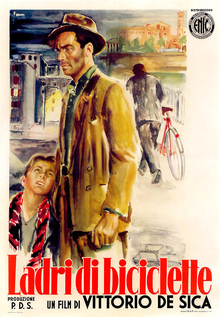
Bicycle Thieves is a 1948 Italian drama film directed by Vittorio De Sica. The film follows the story of a poor father searching post-World War II Rome for his stolen bicycle, without which he will lose the job which was to be the salvation of his young family.
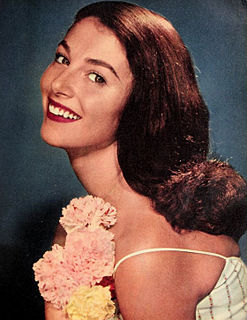
Pier Angeli, also credited under her birth name, Anna Maria Pierangeli, was an Italian-born television and film actress. Her American cinematographic debut was in the starring role of the 1951 film Teresa, for which she won a Golden Globe Award for Young Star of the Year - Actress. She had one son with Vic Damone, her first husband, and another son with Armando Trovajoli, her second husband.

My Voyage to Italy is a personal documentary by acclaimed Italian-American director Martin Scorsese. The film is a voyage through Italian cinema history, marking influential films for Scorsese and particularly covering the Italian neorealism period.
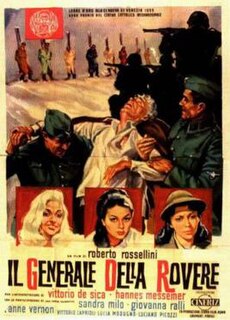
General della Rovere is a 1959 Italian film directed by Roberto Rossellini. The film is based on a novel by Indro Montanelli which was in turn based on a true story.

Maddalena, Zero for Conduct is a 1940 Italian comedy film directed by Vittorio De Sica. It is a remake of the Hungarian film Magda Expelled (1938).

It Happened in the Park is a 1953 film directed by Vittorio de Sica and Gianni Franciolini. The film consists of six vignettes set in the Villa Borghese gardens in Rome.

A Farewell to Arms is a 1957 American DeLuxe Color CinemaScope drama film directed by Charles Vidor. The screenplay by Ben Hecht, based in part on a 1930 play by Laurence Stallings, was the second feature film adaptation of Ernest Hemingway's 1929 semi-autobiographical novel of the same name. It was the last film produced by David O. Selznick. The logo for 20th Century Fox also does not appear at the beginning, due to the movie's poor reception.
The Man Who Smiles is a 1936 Italian comedy film about an Oedipus Complex, directed by Mario Mattoli. The film stars Vittorio De Sica, Umberto Melnati, Enrico Viarisio, Assia Noris and Paola Borboni.

Full Speed is a 1934 Italian comedy film directed by Mario Mattoli and starring Vittorio De Sica, Milly and Camillo Pilotto.

I Love You Only is a 1935 Italian historical drama film directed by Mario Mattoli and starring Milly, Vittorio De Sica and Giuditta Rissone.
Red Roses is a 1940 Italian comedy film directed by Vittorio De Sica and Giuseppe Amato. It was De Sica's first film as a director. De Sica had previously appeared in a 1936 production of the stage play by Aldo De Benedetti on which it was based.

Heart and Soul is a 1948 Italian drama film directed by Vittorio De Sica and Duilio Coletti, based on Edmondo de Amicis' novel Heart. De Sica won the Silver Ribbon for Best Actor by the Italian National Syndicate of Film Journalists.
The Lucky Diamond is a 1933 Italian comedy film directed by Carl Boese and starring Vittorio De Sica.

Antonino Faà di Bruno, was an Italian actor and former military officer.
The 8th Bodil Awards was held 1955 in Copenhagen, Denmark, honouring the best in Danish and foreign film of 1954.
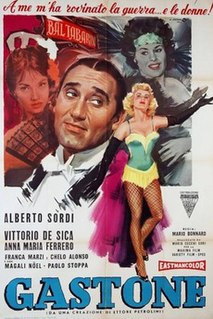
Gastone is a 1960 Italian comedy film co-written and directed by Mario Bonnard and starring Alberto Sordi, Anna Maria Ferrero and Vittorio De Sica. It is loosely based on the Ettore Petrolini's character and comedy play with the same name.
This page is based on this
Wikipedia article Text is available under the
CC BY-SA 4.0 license; additional terms may apply.
Images, videos and audio are available under their respective licenses.
















